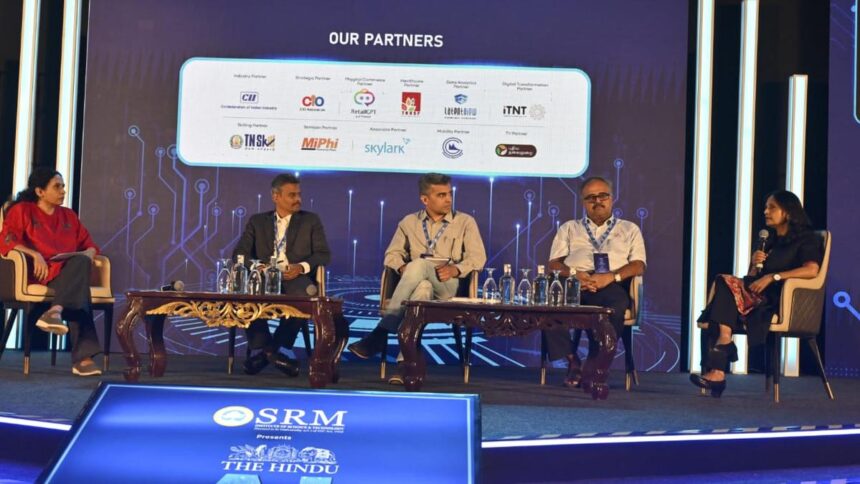[ad_1]

Thamaraiselvan S. (second from left), AVP, Infosec Governance; Hasti Trivedi, President, Chief Digital and AI Officer, Firstsource; Professor B. Ravindran, Head, Department of Data Science and Artificial Intelligence, IIT Madras; Supriya Sahu, Additional Chief Secretary, Department of Health and Family Welfare, Tamil Nadu, during a panel discussion on ‘AI Driven Governance – Concept to Practical Application’. The session was moderated by Ramya Kannan (far left), Chief of Bureau, Tamil Nadu, The Hindu, during The Hindu AI Summit 2024 in Chennai on Thursday
| Photo Credit: Akhila Easwaran
Global consensus is required in formulating regulations for using Artificial Intelligence (AI) in governance to face emerging challenges such as copyrights, data protection, and cyber vulnerability issues, and it is time to think of expanding the usage of AI to newer areas, said panellists at the The Hindu AI Summit 2024 in Chennai on Thursday (November 21, 2024).

During a panel discussion on the topic ‘AI Driven Governance – Concept to Practical Application’, moderated by Ramya Kannan, Chief of Bureau, Tamil Nadu, The Hindu, Surpiya Sahu, Additional Chief Secretary, Department of Health and Family Welfare, Government of Tamil Nadu, said the Health Department, in 2022, had introduced AI in diagnosing tuberculosis in six districts in the State.
“We have 45 mobile vans fitted with digital X-ray machines to go around in remote and inaccessible areas. Out of these, six vans have been fitted with an AI tool, and more than 56,000 people have been screened by this tool in the last two years. The rate of detection, in comparison to the traditional models, is twice, and it is as precise as it would be done manually.”
Ms. Sahu said it is time to think of expanding the usage of AI to newer areas. She also explained how AI helped in averting elephant deaths in rail accidents in Madukkarai Forest Range in Coimbatore district.
“We were wondering what we can do to prevent elephant deaths on railway tracks in Coimbatore district, where the railway tracks pass through the forest and divide two reserve forest patches. Elephants migrate from one patch to another to drink water and forage. There were accidents resulting in the death of elephants. But AI came to our rescue,” she said.

“The Forest Department had set up towers with AI-enabled thermal cameras and a central control room, which gets alerts from these cameras as and when an elephant crosses. These real-time alerts were passed on to the loco pilots. It was a simple AI tool, but it has actually saved thousands of lives.”Surpiya SahuAdditional Chief Secretary, Department of Health and Family Welfare, Government of Tamil Nadu
She said, in the health sector, AI has the potential to play an important role in screening refractive eye errors among children and detecting pregnancy-induced hypertension (PIH). Early detection of PIH would prevent maternal mortality to a great extent. She also said the State government is considering an AI mission for health.
Stressing the need to build adequate digital infrastructure before AI can have an impact, B. Ravindran, Head, Data Science and Artificial Intelligence, Indian Institute of Technology, Madras, urged governments to actively work towards this.
“AI is not a single technology, but a slew of different things. We don’t need AI to solve all problems. We have to figure out what is the right solution that we need, especially in governance… What we see in most of the places where AI has made an impact, the actual AI solution itself is about 20 to 30% of the system,” he said.
He also sounded a word of caution that pushing the current state of AI models into governance would institutionalise models and is likely to ignore our cultural map. “We can talk about building AI models for the Indian condition. But we need to put in a lot of effort trying to build these safeguards for India. There is so much that is unique, like language, cuisine, literature to every State and region in this country that we need to capture.” He also said the Union government is planning to set up an AI safety institute soon.
Hasit Trivedi, President, Chief Digital and AI Officer, Firstsource, said India has taken the lead in getting a global consensus on AI in governance. “The bias, fairness, and risks have always been there since the birth of AI. But new things which came because of generative AI are copyright issues, data protection issues, and cyber vulnerability, and they require global consensus… From the Indian context, we have to be very careful because we should not be exporting the data. Data protection, usage, and localisation are extremely critical. I think we should ensure that we as a country do not become digital slaves.”
He also said, only the United States of America, China, and India have the potential to create AI technologies. “The U.S has already created AI. China is in the race. India is the potential third country which can make a meaningful contribution to global AI.”
S. Thamaraiselvan, Assistant Vice President, Infosec Governance, Hexaware, said “The accuracy of the output that AI provides depends on the amount of data that we feed. In this context, we are already witnessing the digitisation in government sectors which is yielding results for us in terms of the efficiencies in consuming various services… Indians are the largest consumers of generative AI today. But we should explore how India can become a generator of AI technologies rather than consuming it. Even if we are consuming the data, we should explore to localise it to the Indian context.”
The event is presented by the SRM Institute of Science & Technology (SRMIST) and powered by Sify, in association with Manage Engine. The Confederation of Indian Industry is the industry partner and CIO Association is the strategic partner. RetailGPT is the phygital commerce partner for the summit, Tamil Nadu Health Systems Project the healthcare partner, and LatentView Analytics the data analytics partner. Tamil Nadu Technology Hub (iTNT) has been roped in as the digital transformation partner, while Tamil Nadu Skill Development Corporation has come in as the skilling partner. Chennai Metro Rail is the mobility partner, and the TV partner is Puthiya Thalaimurai.
Published – November 21, 2024 02:01 pm IST
[ad_2]
Source link







